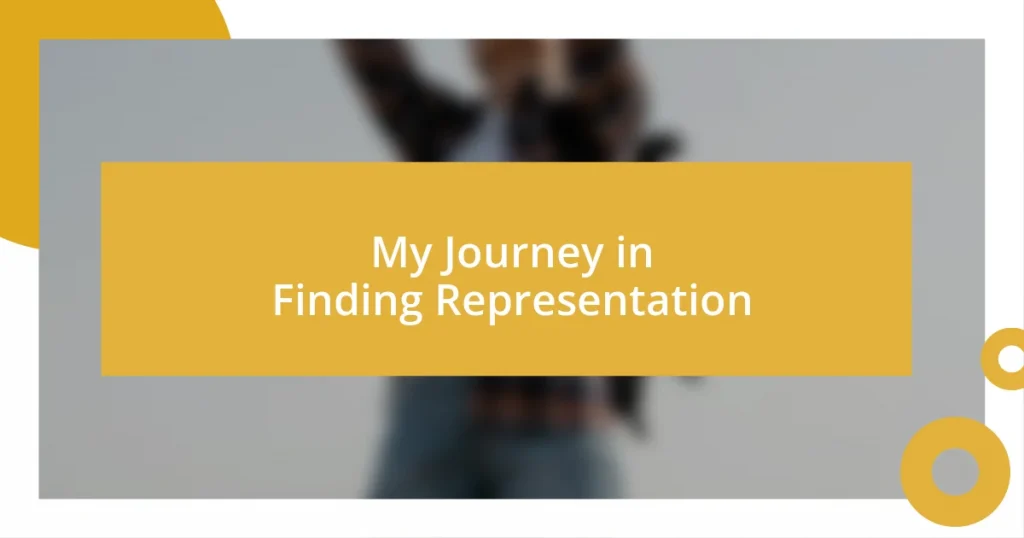Key takeaways:
- Representation fosters inclusivity and a sense of belonging; seeing oneself reflected in stories can validate experiences and spark connection.
- Identifying personal representation needs involves self-reflection on cultural background, experiences, and intersectional identity to articulate the desire for understanding and valuing oneself.
- Building a representation path requires intentional networking, curating diverse content, and recognizing challenges as part of a continuous journey toward authentic self-advocacy.
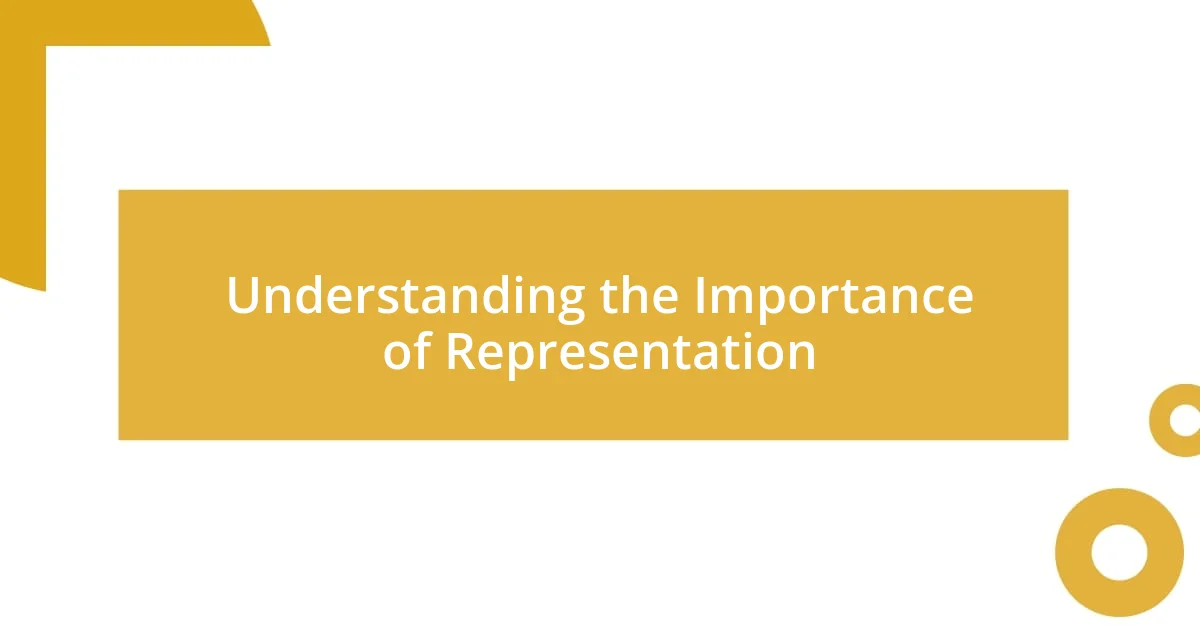
Understanding the Importance of Representation
Representation is not just a buzzword; it’s the heartbeat of inclusivity. I remember attending a community event where I saw someone who looked like me up on the stage, speaking confidently about her experiences. In that moment, I felt a sense of belonging and validation I hadn’t known before—how often do we overlook the power of seeing ourselves in the stories around us?
When I reflect on the times I’ve felt unheard or invisible, it becomes clear how crucial representation is for fostering genuine connections. It’s disheartening to think about how many voices remain silenced simply because they aren’t reflected in mainstream narratives. This raises a vital question: how can we build bridges in our communities if we don’t see the diverse tapestry of experiences that truly exist?
Moreover, representation shapes perspectives and influences decisions. The first time I saw a character in a book that mirrored my background, it ignited a spark within me. It made me wonder, why do so many people lack the chance to feel that spark? I believe that when we share our stories—the rich, complex, and often messy journeys of our lives—we create pathways for understanding and empathy, ultimately enriching us all.
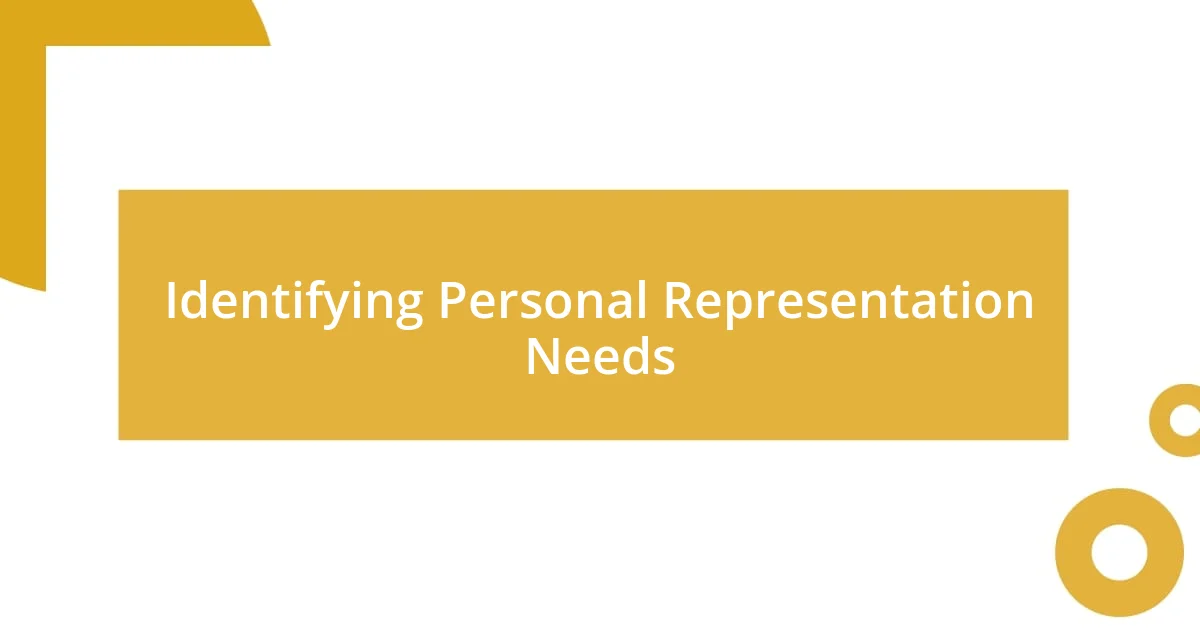
Identifying Personal Representation Needs
Identifying personal representation needs is an introspective journey that requires honest self-reflection. I’ve often had to pause and ask myself what aspects of my identity feel neglected or underrepresented in the spaces I inhabit. It’s a bit like looking in the mirror and discovering parts of myself I hadn’t acknowledged before. This approach has helped me articulate what I’m truly seeking; it’s not just about being seen but being understood and valued for who I am.
Here’s a list of key considerations that can help in identifying personal representation needs:
- Cultural Background: Reflect on your heritage—are there aspects of your culture that you want to see represented?
- Experiences and Stories: Consider your unique life experiences—do they resonate with what you see in media or leadership roles?
- Community Connections: Think about the communities you belong to—do you feel their voices are adequately represented?
- Intersectionality: Acknowledge the different facets of your identity, such as race, gender, and sexuality—how do they influence your need for representation?
- Relatable Role Models: Identify figures who inspire you—how do their representations challenge or reaffirm your own experiences?
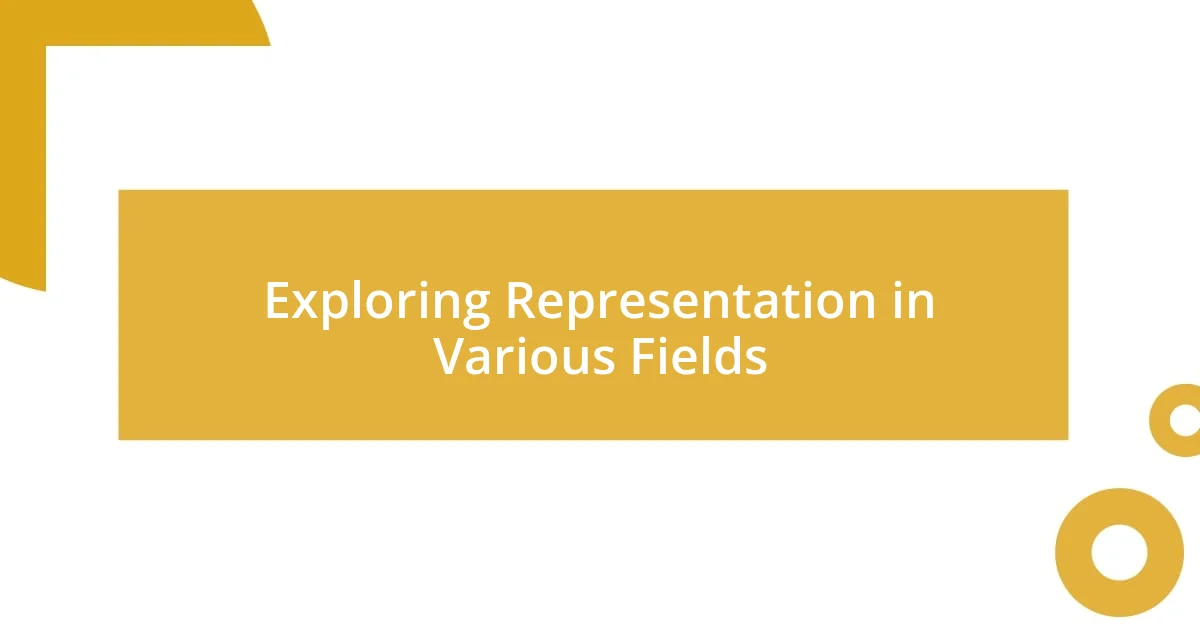
Exploring Representation in Various Fields
The landscape of representation varies widely across fields like media, politics, and education. In the media, I recall the profound impact of a documentary that featured individuals from marginalized communities sharing their authentic stories. It was enlightening to see how these narratives can challenge stereotypes and shift public perceptions. In politics, having leaders who reflect the diversity of their constituents brings authenticity to governance, as I’ve personally witnessed community impact when elected officials share similar backgrounds and experiences.
In the educational sector, representation plays a crucial role in shaping students’ aspirations. When I had a teacher who looked like me, it was more than just encouragement; it was a validation of my potential. That representation in the classroom can foster ambition in students by showing them that they too can achieve greatness. This connection is vital; how can students dream about possibilities when they don’t see themselves in their role models?
Now, let’s consider how different fields approach representation through a comparative lens:
| Field | Impact of Representation |
|---|---|
| Media | Shifts public perceptions through authentic storytelling. |
| Politics | Fosters trust and engagement among constituents. |
| Education | Inspires students by showcasing relatable role models. |
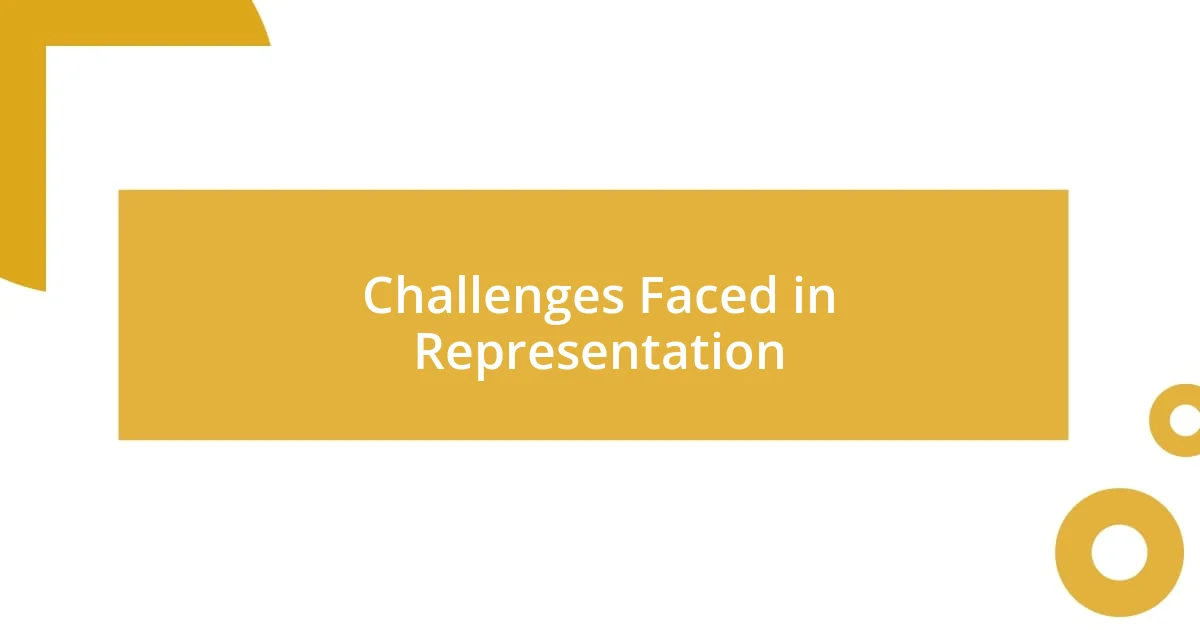
Challenges Faced in Representation
Finding effective representation has not come without its challenges for me. One significant hurdle I encountered was the overwhelming feeling of invisibility in various spaces. I remember attending events or forums where the conversations seemed to fly right over my head, with almost no acknowledgment of my background or experiences. It’s disheartening to realize that you’re part of a crowd yet feel completely isolated. Have you ever felt like that?
Another struggle has been the pushback I experienced when voicing my needs for representation. Often, I’ve felt the urge to raise concerns about inclusivity, only to face resistance or dismissive attitudes from those who hold the power. It can feel like an uphill battle, where the very act of expressing the need for representation opens the door to confrontation. I often reflect on how exhausting it can be to advocate for my identity in spaces that don’t always welcome it.
Navigating the intersections of my identity poses yet another layer of complexity. I recall a moment when I tried to discuss the unique challenges I faced as a queer person of color. The response was often a silence that felt heavy—they just didn’t understand. How can we foster genuine dialogue if the intersectionality of identities remains unexamined? It’s a reminder that representation isn’t just about quantity but also the depth of understanding and connection that needs acknowledgment.
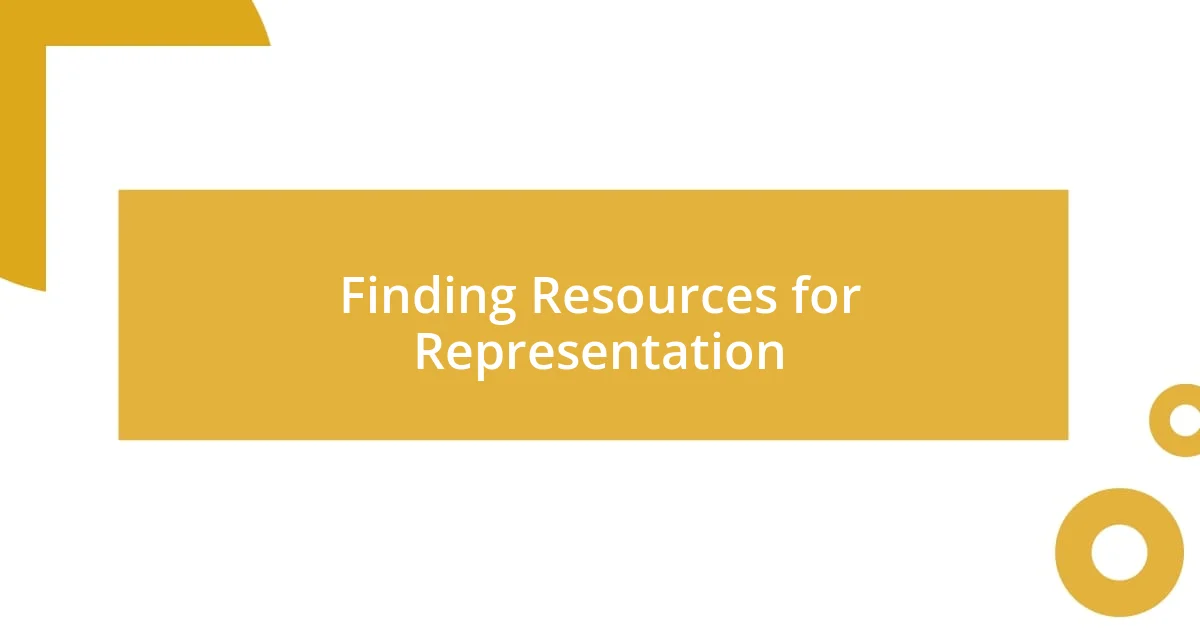
Finding Resources for Representation
Finding resources for representation has been a transformative part of my journey. I remember combing through online forums and community groups, trying to connect with individuals who understood my experiences. One site, in particular, stood out to me because it not only listed resources but also fostered a sense of community. It was like stepping into a virtual room filled with people who shared my struggles, igniting a spark of hope that I wasn’t alone.
Another invaluable resource I discovered was local advocacy organizations dedicated to promoting representation. I vividly recall attending a workshop hosted by one of these groups. It was both empowering and eye-opening to engage with advocates who shared their personal stories about the importance of visibility and diverse representation in our communities. The passion in the room was palpable—how often do you get the chance to connect with others whose voices resonate with your own?
Exploring social media also led me to unexpected gems. Platforms like Instagram and Twitter became vital in discovering individuals—artists, activists, and scholars—who actively discuss representation. One famous artist I follow posts artwork that reflects the struggles of underrepresented communities. Every piece is a conversation starter, reminding me that representation isn’t just a checkbox; it’s a vibrant tapestry of lives and stories intertwined. Have you found any similar connections that inspired you?
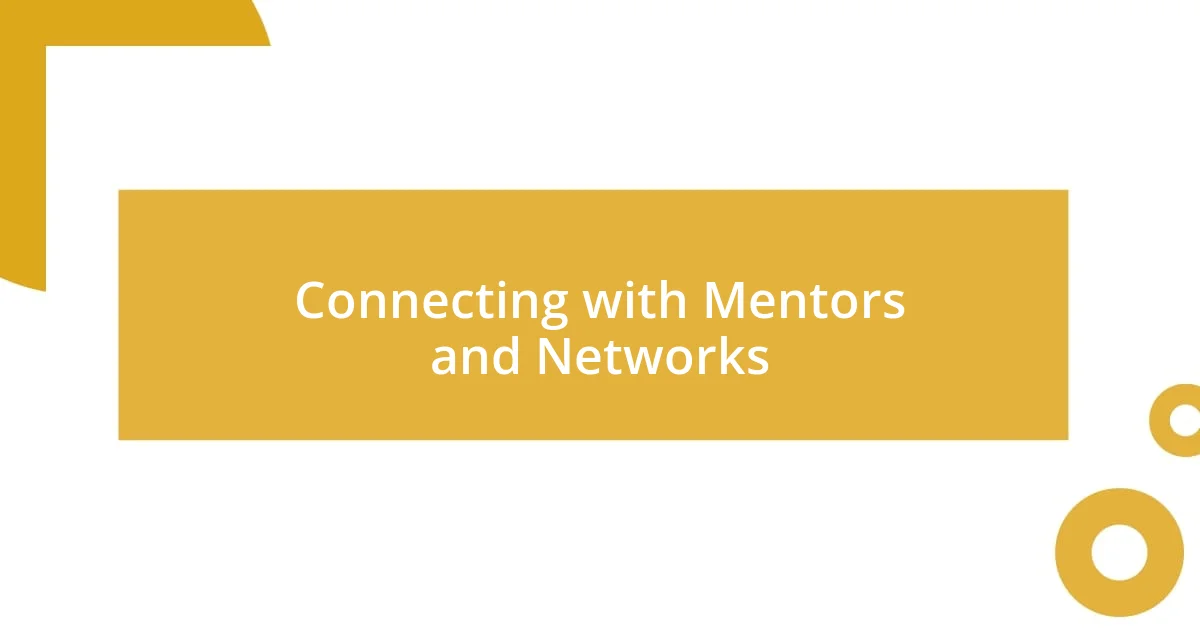
Connecting with Mentors and Networks
Connecting with mentors has played an essential role in my journey toward representation. I remember reaching out to a seasoned professional in my field who had a similar background. The conversation was enlightening; she shared experiences of navigating hurdles and introduced me to an expansive network of individuals who were genuinely passionate about inclusivity. Can you imagine how empowering it felt to know that I had someone in my corner who understood the unique challenges I faced?
Networks, both online and offline, have also proven invaluable in finding representation. I found the most remarkable connections at community meetups where honest conversations unfolded effortlessly. It reminded me of a local event where I met an inspiring activist whose story about advocating for marginalized voices resonated deeply with me. His authenticity fueled my desire to connect with others who are equally committed to fostering change. Have you ever walked away from a conversation feeling invigorated and ready to make a difference?
As I’ve immersed myself in these spaces, I’ve realized the power of intentional networking. It’s not just about knowing people—it’s about creating relationships grounded in shared values and mutual support. I once joined a mentorship program where we paired with individuals from various backgrounds. The discussions we had opened my eyes to perspectives I had never considered. The beauty of connections lies in the richness they bring to our understanding of representation, shaping the way we advocate for ourselves and others. How have your connections influenced your journey to find your voice?
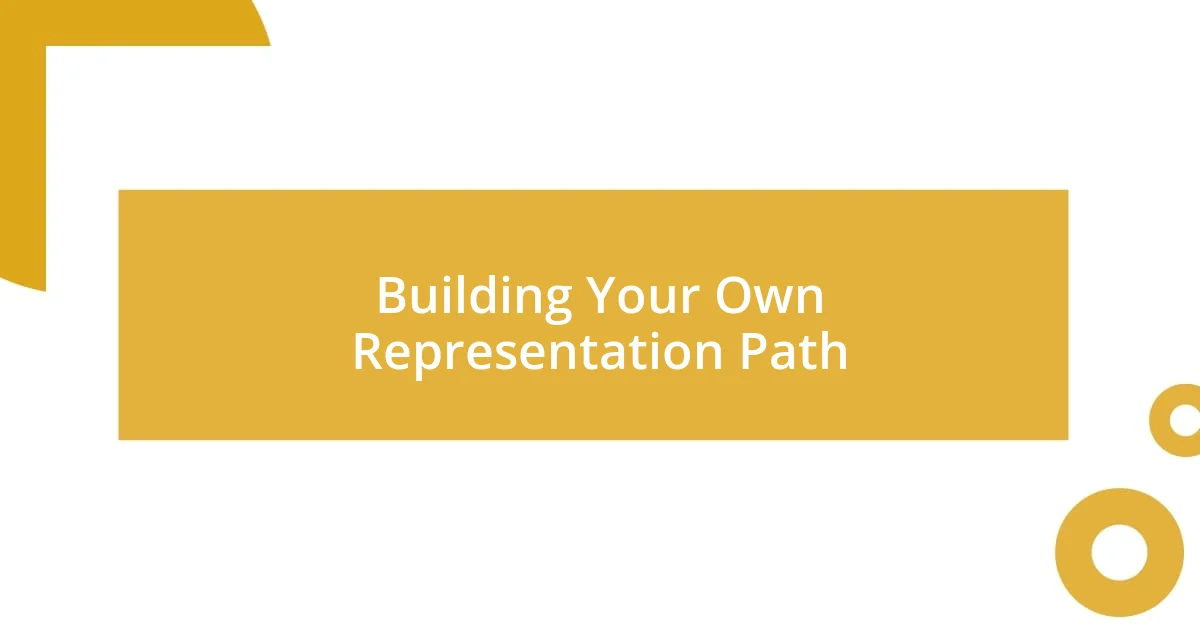
Building Your Own Representation Path
Building your own path toward representation requires a blend of personal commitment and proactive exploration. I recall the day I set out to define my own journey. Armed with sticky notes, I mapped out the qualities and experiences I sought in resources and mentors. It felt almost therapeutic to visualize my goals, and I remember thinking, “If I can articulate what I need, I can better navigate this landscape.” Have you ever laid your thoughts out like this? It really makes a difference.
As I ventured deeper, I started actively curating my own content mix. I began following diverse creators who not only inspired me but also challenged my perceptions. One evening, I stumbled upon a podcast that featured individuals who advocated for underrepresented communities. Listening to their stories moved me to tears; their experiences mirrored my own aspirations and struggles. How profound it was to realize that each voice added a new thread to the intricate fabric of representation!
Building intentionality into my search for representation also meant recognizing roadblocks. I faced moments of doubt, wondering if my voice truly mattered in such a vast chorus. But each time I encountered challenges, I reminded myself that representation is not a destination—it’s a continuous journey. Have you faced hesitations in your progress? For me, transforming those doubts into motivation became a vital step in creating a representation path that felt authentically mine.










